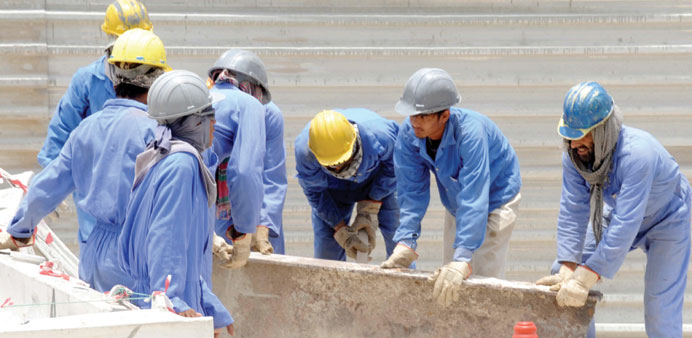|
The Qatar Foundation report has recommended that a minimum wage for all occupations in the construction sector in Qatar, regardless of nationality, would help prevent the exploitation of workers.
A standardised contract and ethical recruitment practices including a total ban on recruitment fees are some of the recommendations that have been suggested in the ‘Migrant Labour Recruitment to Qatar’ report released by Qatar Foundation on Saturday. |
The report recommends that the Qatar government should seek to ensure ethical recruitment practices in the labour-sending countries by developing government-to-government agreements on recruitment that could include electronic Internet recruitment. Through collaboration, this could be developed for the region as a whole.
A significant point raised in the report is the amount of money paid by the workers to secure a job in Qatar and other Gulf countries. It emphasises that recruitment fees should be re-classified as a form of “bribe” extorted by recruitment agents and banned. Workers should not pay any charge or fees for recruitment and arrive in Qatar debt-free. Employing companies should pay for all recruitment costs as is the norm for highly skilled workers and professionals.
Another important recommendation is that a minimum wage for all occupations in the construction sector in Qatar, regardless of nationality, would help prevent the exploitation of workers from particular countries.
The report calls for comprehensive accreditation process of recruitment agencies. It suggests that ethical recruitment agencies must be employed who take nothing from migrant workers to ensure proper recruitment practices. Sub-agents in local regions should also be regulated, brought under ethical agencies, or not used at all.
A formal collaboration between Qatar, its clients and government agencies of the countries from where workers are sent will help in this regard. The Qatari government could also establish its own recruitment agency with offices in the main labour-sending countries.
The report highlights the need for developing a standardised contract that makes terms and conditions of employment clearly understood by the contractor and the worker. It must also include detailed termination conditions and liabilities linked to exit visa and NOC rights.
The procedures could include a stipulaion that all parties, including the prospective migrant workers, be required to sign contracts in their own native language and with time for consideration prior to departure. The workers could be required to produce the contract for registration by Qatari representatives in the country of origin, or on arrival in Qatar and be registered with the Ministry of Labour.
All workers should retain a copy of their original contract at all times. Substitute contracts on arrival should be banned unless they are advantageous to the worker. A more independent complaints mechanism should be established for workers to register their grievances and have their rights reviewed and with access to legal aid.
The problems of the current private sponsorship system could be overcome by seriously addressing the loopholes that allow its abuse, or have the government undertake the role and responsibilities of sponsorship for all migrant workers, the report said.
“However, denial of an exit visa or NOC should qualify for an automatic, independent and speedy judicial review and legal representation with rights of residency and employment until resolved.”
The report also points out that the agencies in Qatar who supply or lease labour on a temporary basis need to be monitored to ensure compliance with ethical recruitment standards. It also speaks about the need for pre- and post- departure orientation for the migrant labourers.
Report blames recruiters abroad for abuse
The recruitment agencies in Asia were the main party to blame for any abuse of migrant workers, the report commissioned by the Qatar Foundation has said. It said that the rights of migrants, mainly Asians, are flouted in their home countries from the moment they sign up for work.
“Critics of human and labour rights violations most often shift the blame to Qatar in a rather generic manner,” said the report focused on workers from Bangladesh, India, Nepal, the Philippines and Sri Lanka.
“Far less attention has been given to the violations by the migrants’ own nationals in their countries of origin, in addition to those who are complicit in Qatar,” it said.
The report insisted that this criticism underscores the need to determine the level of abuse committed at the recruitment stage, and introduce legislation in order to stamp it out.
“It is necessary to ascertain to what extent trafficking, debt bondage and forced labour, that largely result from recruitment processes... could be addressed and leveraged by the Qatari authorities,” it said.

